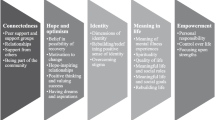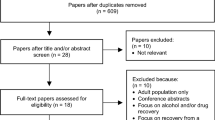Abstract
Personal recovery from mental illness differs from clinical recovery in that it focuses on fostering hope, purpose and a meaningful life regardless of the symptoms and challenges associated with the diagnosis. A number of frameworks have been developed to inform recovery-oriented practice based on the adult recovery experience. The applicability of the framework to distinct sub-populations, such as adolescents, who are at a different developmental stage, warrants more in-depth exploration. The present study aims to understand the recovery phenomenon from the perspectives of adolescents. Using a phenomenological approach, we interviewed nine adolescents accessing mental health services in a specialized mental health hospital in Canada. The majority (78%) of study participants were female. All participants except one accessed mental health services through inpatient care. Three overarching themes that facilitate recovery among adolescents were identified: enhancing identity, connection, and autonomy. There is little established theory about a recovery-oriented approach to which young people can relate in describing their recovery journeys. The present study fills this gap while also highlighting the voices of adolescents. These results can inform recovery-oriented practice guidelines for adolescents.
Similar content being viewed by others
References
Anthony, W. A. (1993). Recovery from mental illness: The guiding vision of the mental health service system in the 1990s. Psychosocial Rehabilitation Journal, 16(4), 11–23. https://doi.org/10.1037/h0095655
Bradbury-Jones, C., Irvine, F., & Sambrook, S. (2010). Phenomenology and participant feedback: Convention or contention? Nurse Researcher, 17, 25–33. https://doi.org/10.7748/nr2010.01.17.2.25.c7459
Brubacher, S. P., Powell, M. B., Snow, P. C., Skouteris, H., & Manger, B. (2016). Guidelines for teachers to elicit detailed and accurate narrative accounts from children. Children and Youth Services Review, 63, 83–92. https://doi.org/10.1016/j.childyouth.2016.02.018
Chodos, H., d’Auteuil, S., Martin, N., & Raymond, G. (2015). Guidelines for recovery-oriented practice: Hope. Dignity. Inclusion. Mental Health Commission of Canada.
de Jager, A., Fogarty, A., Tewson, A., Lenette, C., & Boydell, K. M. (2017). Digital storytelling in research: A systematic review. The Qualitative Research, 22(10), 2548–2582. https://doi.org/10.46743/2160-3715/2017.2970
Fenzel, L. M. (1994). A prospective study of the effects of chronic strains on early adolescent self-worth and school adjustment. In Meeting of the Society for Research on Adolescence, San Diego.
Gandhi, S., Chiu, M., Lam, K., Cairney, J. C., Guttmann, A., & Kurdyak, P. (2016). Mental Health Service Use Among Children and Youth in Ontario: Population-Based Trends Over Time. The Canadian Journal of Psychiatry, 61(2), 119–124. https://doi.org/10.1177/0706743715621254
Groenewald, T. (2004). A phenomenological research design illustrated. International Journal of Qualitative Methods, 3(1), 42–55.
Haber, J., & LoBiondo-Wood, G. (2001). Nursing research: Methods, critical appraisal, and utilization. Elsevier.
Harter, S. (1990). Causes, correlates and the functional role of global self worth: A life span perspective. In R. Stenberg, & J Kolligian (Eds.), Competence considered (pp. 67–98). New Haven, CT: Yale University Press.
Kelly, M., & Coughlan, B. (2019). A theory of youth mental health recovery from a parental perspective. Child and Adolescent Mental Health, 24(2), 161–169. https://doi.org/10.1111/camh.12300
Kessler, R. C., Berglund, P., Demler, O., Jin, R., Merikangas, K. R., & Walters, E. E. (2005). Lifetime Prevalence and Age-of-Onset Distributions of DSM-IV Disorders in the National Comorbidity Survey Replication. Archives of General Psychiatry, 62(6), 593–602. https://doi.org/10.1001/archpsyc.62.6.593
Leamy, M., Bird, V., Le Boutillier, C., Williams, J., & Slade, M. (2011). Conceptual framework for personal recovery in mental health: Systematic review and narrative synthesis. The British Journal of Psychiatry: The Journal of Mental Science, 199(6), 445–452. PubMed. https://doi.org/10.1192/bjp.bp.110.083733
Leavey, J. E. (2009). Youth experiences of living with mental health problems: Emergence, loss, adaptation and recovery (ELAR). Canadian Journal of Community Mental Health, 24(2), 109–126.
Mancini, A. D. (2008). Self-determination theory: A framework for the recovery paradigm. Advances in Psychiatric Treatment, 14(5), 358–365. Cambridge Core. https://doi.org/10.1192/apt.bp.107.004036
Neubauer, B. E., Witkop, C. T., & Varpio, L. (2019). How phenomenology can help us learn from the experiences of others. Perspectives on Medical Education, 8(2), 90–97. PubMed. https://doi.org/10.1007/s40037-019-0509-2
Patton, M. Q. (1990). Qualitative evaluation and research methods, 2nd ed. (p. 532). Sage Publications, Inc.
Santrock, J. (2005). Adolescence (10th ed.). McGraw Hill.
Tse, S., Tsoi, E. W., Hamilton, B., O’Hagan, M., Shepherd, G., Slade, M., Whitley, R., & Petrakis, M. (2016). Uses of strength-based interventions for people with serious mental illness: A critical review. International Journal of Social Psychiatry, 62(3), 281–291. https://doi.org/10.1177/0020764015623970
Ward, D. (2014). ‘Recovery’: Does it fit for adolescent mental health? Journal of Child & Adolescent Mental Health, 26(1), 83–90. https://doi.org/10.2989/17280583.2013.877465
Funding
This study was funded by Mental Health Commission of Canada.
Author information
Authors and Affiliations
Corresponding author
Ethics declarations
Conflict of interest
Authors have no conflict of interest to declare.
Ethical approval
The study received Research Ethics Board (REB) approval from Ontario Shores Centre for Mental Health Sciences REB (REB #18-015-B).
Informed consent
Written informed consent was sought from all study participants.
Additional information
Publisher's Note
Springer Nature remains neutral with regard to jurisdictional claims in published maps and institutional affiliations.
Rights and permissions
About this article
Cite this article
Arbour, S., Chiu, M., Paul, S. et al. Exploring the Recovery Phenomenon from Adolescents’ Perspective: A Qualitative Study. J. Psychosoc. Rehabil. Ment. Health 10, 15–24 (2023). https://doi.org/10.1007/s40737-022-00283-7
Received:
Accepted:
Published:
Issue Date:
DOI: https://doi.org/10.1007/s40737-022-00283-7




